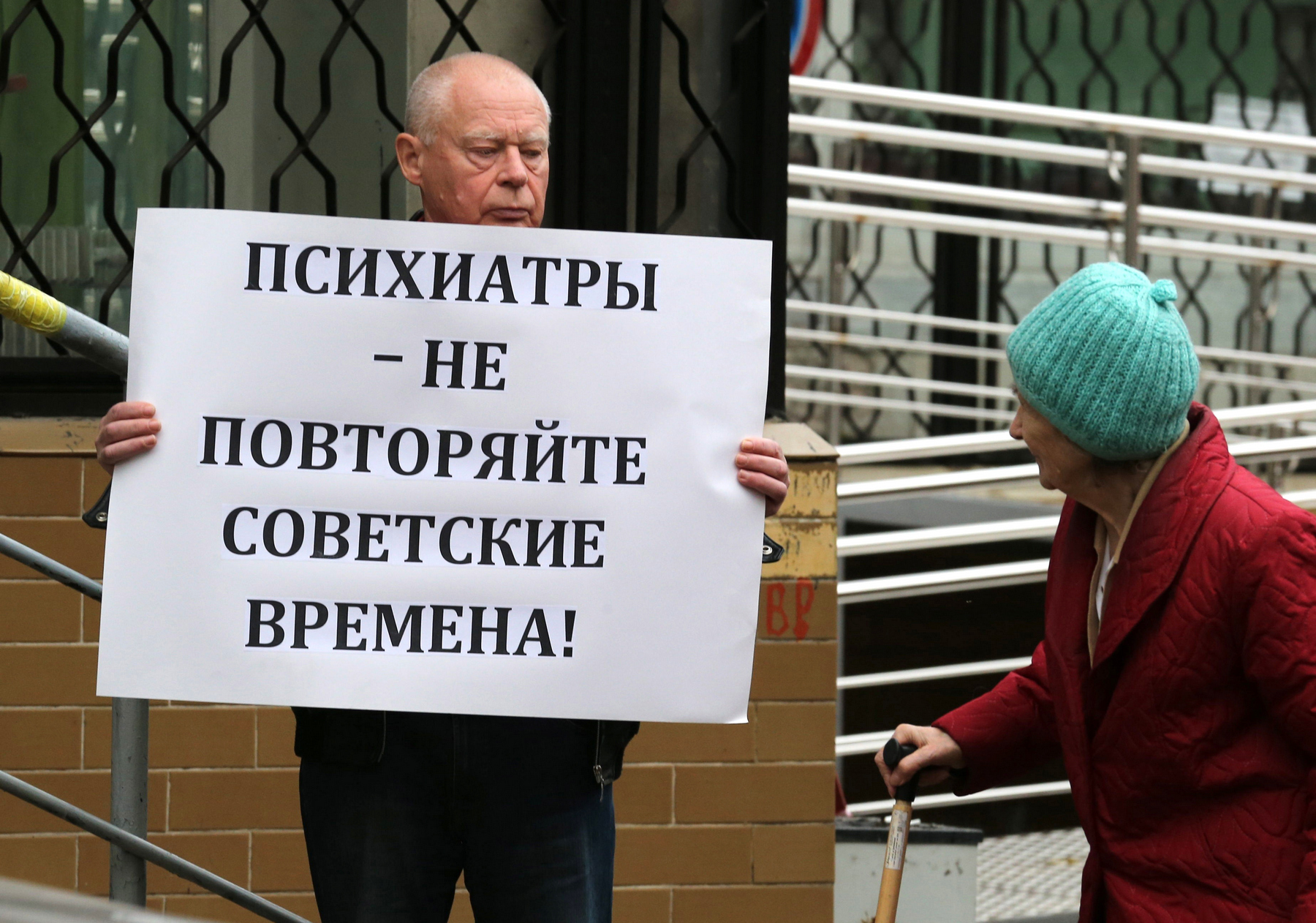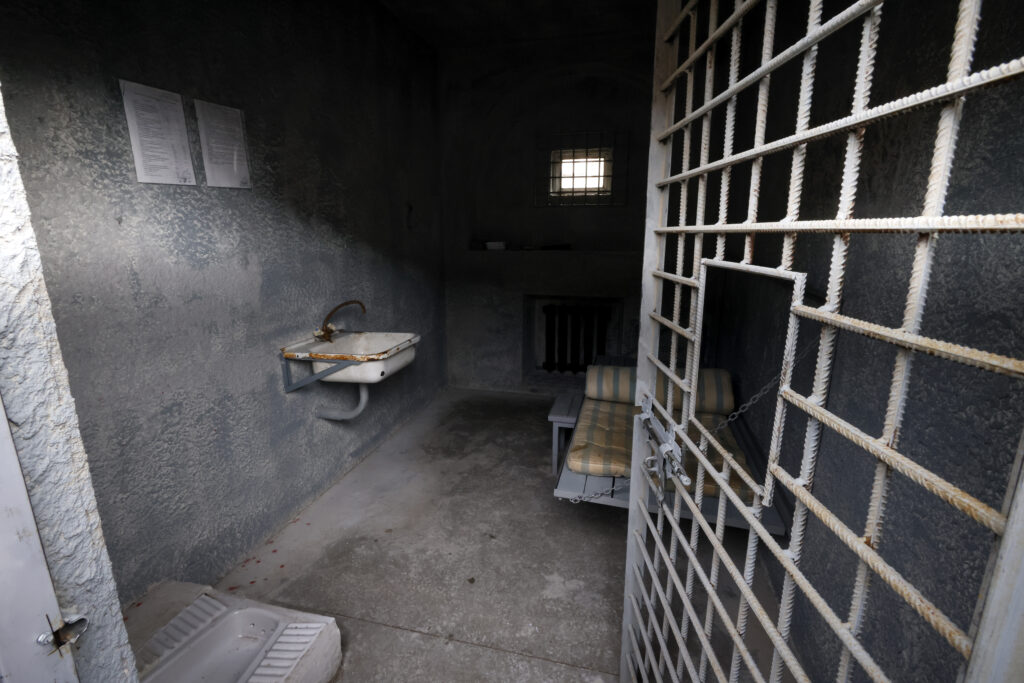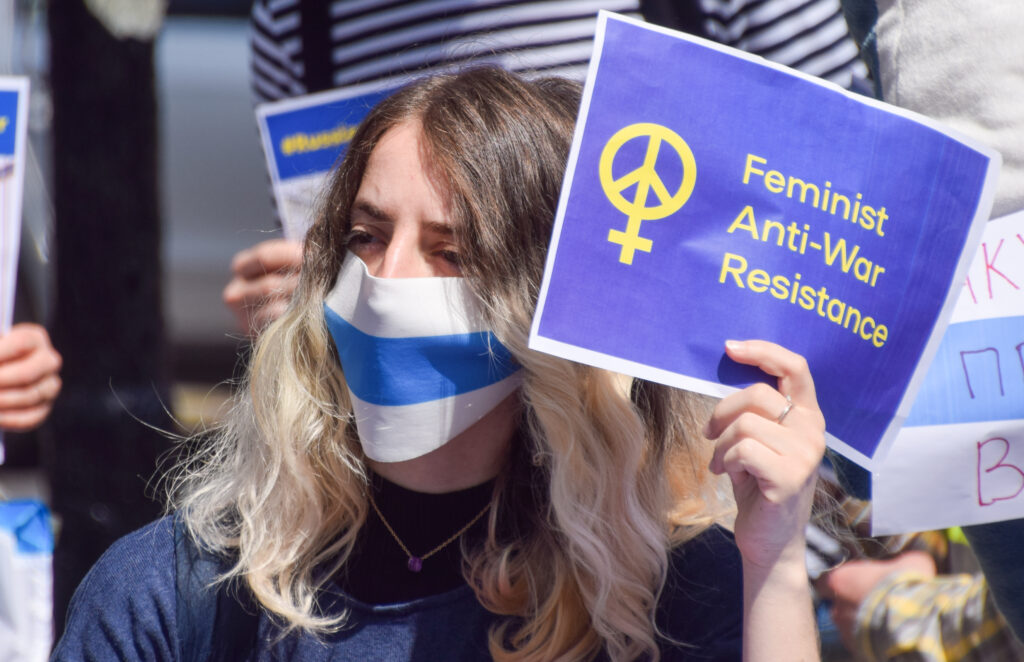From 1960−1980, psychiatry was one of the main instruments of repression in the USSR. The authorities persecuted dissidents and human rights defenders including Yegor Letov, Natalya Gorbanevskaya, Zhores Medvedev, Valeriya Novodvorskaya, Iosif Brodsky and Petro Grigorenko. According to the International Society for Human Rights, about 2 million people across the country fell victim to the political abuse of psychiatry.
Opponents of the communist regime were diagnosed with ‘sluggish schizophrenia’ and held against their will. This mental disorder went unrecognised by the WHO. A diagnosis came, for example, when a ‘patient’ exhibited reformism, religiosity or original behaviour. Lyudmila Alexeyeva, one of the founders of the Moscow Helsinki Group, explained that Soviet psychiatrists used the following logic: ‘Would someone in their right mind call for overthrowing Soviet rule?’
Individuals diagnosed with sluggish schizophrenia were deprived of their driving licences. They could not study in institutions of higher learning or go abroad. They were locked up in psychiatric hospitals before major events or public holidays (e.g. 1 May, 7 November).
In 1977, the General Assembly of the World Psychiatric Association (WPA) adopted a resolution criticising Soviet punitive psychiatry. Six years later, the Soviet All-Union Scientific Society of Neurologists and Psychiatrists, whose reputation was shattered by the persecution of activists before the 1980 Summer Olympics, took a pre-emptive step. It voluntarily left the WPA before being expelled from it.
During perestroika and glasnost, the USSR admitted some facts about psychiatric abuse and promised to stop it.
Russian practice
The current Russian authorities have been accused of using punitive psychiatry against dissenters in some cases. This return to old habits has been noticeable especially since 2012, when Vladimir Putin became the head of state again after his ‘job swap’ with Dmitry Medvedev. But an important caveat here: the current situation in Russia does not even come close to that of the Soviet period. The image of punitive psychiatry is used today as a way to intimidate dissenters in theory rather than in practice.
Involuntary commitment of civil activists
In 2012, during the local parliamentary session, Chairman of the Government of the Altai Republic Alexander Berdnikov called journalist Ruslan Makarov ‘a mentally ill person’ under psychiatric treatment. Later, the correspondent claimed his two-week involuntary placement in a psychiatric facility was due solely to criticism of the governor, a lawsuit filed by Berdnikov and criminal proceedings initiated against him. The ECtHR confirmed a violation of the right to liberty and security of person. It awarded Makarov EUR 1,500 as compensation for non-pecuniary damage.
In 2017, a Chita court ruled that the Russia’s Ministry of Finance must pay RUB 20,000 to Nikolay Likhanov for illegal involuntary placement in a psychiatric facility, where he spent 23 days. Likhanov’s active civil stance annoyed the gubernatorial administration. One of the arguments in favour of involuntary commitment voiced by public officials in court was that Likhanov was ‘imposing his point of view’.
Previously, only physicians had the right to demand in court that a citizen be involuntarily placed in a psychiatric hospital. But in 2018 Putin granted this right to prosecutors as well. Considering there exists a reporting system on performance assessment of law enforcement, prosecutors will have an incentive to exercise this right.
In July 2020, the Legislative Assembly of Leningrad Oblast submitted a draft bill to the State Duma of the Russian Federation. The bill expands the powers of the Ministry of Interior to involuntarily hospitalise individuals in psychiatric hospitals. Today, police officers can provide assistance to healthcare workers only if there is a court decision.
Forensic examinations
In 2012, a case for the incitement of hatred against Orthodox believers was brought against Maxim Yefimov, the head of the Karelian Youth Human Rights Group, after he published the article ‘Karelia is tired of Orthodox priests’ online. The initial psychiatric examination did not reveal any disorders. Still, experts stated the need for examination. The expert commission requested references from studies and his employer and information from interviews with relatives and friends. Obviously, this extra information could have been obtained without Yefimov’s hospitalisation. Having won political asylum in Estonia, the activist decided to leave Russia.
Also in 2012, members of the band Pussy Riot, Nadezhda Tolokonnikova and Yekaterina Samutsevich, underwent forensic psychiatric examinations as part of a criminal case. They were diagnosed with personality disorders manifested in ‘a proactive attitude, striving for self-fulfilment’, ‘obstinacy and standing their ground’.
In 2015, performance artist Pyotr Pavlensky was accused of setting the door of the FSB building in Lubyanka on fire and referred to a psychiatric hospital for examination after he refused to talk to a psychiatrist in a detention facility. After that, one of the leading Russian psychiatrists, Vladimir Mendelevich, wrote an article titled ‘The case of performance artist Pyotr Pavlensky: psychopathology or modern art?’ Mendelevich concludes that ‘psychiatry should not interfere either in political activism or metamorphoses of contemporary artistic expression’.
In 2020, law enforcement officers detained ‘shaman’ Alexander Gabyshev in Yakutia. Gabyshev intended to ‘oust Putin from the Kremlin’. He was involuntarily kept in a psychiatric facility for over two months. The shaman’s lawyers filed a complaint to the ECtHR and Memorial classified him as a political prisoner.
In nearly all these cases, relatives and defenders expressed serious doubts about the investigative agencies’ procedural decisions. They questioned the findings of expert examinations. Thus, Mikhail Kosenko, a figure in the Bolotnaya Square case, was involuntarily committed to a psychiatric hospital. The President of the Independent Psychiatric Association of Russia, Yuri Savenko, pointed out that Kosenko’s diagnosis of a schizotypal disorder was changed to paranoid schizophrenia after a single meeting with a psychiatrist, although Kosenko had earlier been treated for schizotypal disorder for 12 years.
Statistics
As of 2017, the number of Russians suffering from mental disorders reached nearly 4 million people (3% of the country’s population). According to Zurab Kekelidze, the chief psychiatrist of the Ministry of Health, in reality the number in need of psychiatric treatment is five times higher, i.e. 20 million people (14% of Russians). Many Russians do not seek medical help because of fear of psychiatric treatment which may result in being labelled an unreliable person for life.
According to official statistical data, morbidity from mental disorders decreased by 7.48%, from 2,966.58 to 2,744.44 per 100,000 in 2005−2016. The primary morbidity rate dropped by 23.5% (from 388.30 to 296.67). That said, human rights defenders note that the number of forensic psychiatric examinations (FPEs) initiated by investigative authorities and courts has been on the rise since 2006. The number grew year on year by 11.5% in 2014, 19.4% in 2015 and 2.6 in 2016.
The figures vary significantly by region. In 2014, 6.6% of those examined were diagnosed with mental illness based on the results of FPEs. The indicator was much higher in some regions, reaching 16% in Vladimir Oblast and 22.6% in Dagestan. Such a discrepancy indicates that there are different forms of communication between law enforcement and psychiatrists across regions in Russia.
Cooperation between the siloviki and psychiatrists
The siloviki are always satisfied when the defendant is found insane. Such a diagnosis is equated with a guilty verdict and is in favour of the investigator and the judge, who do not have to make extra efforts at collecting evidence or involving a prosecutor in a criminal case.
Another problem indicated by psychiatrists themselves is related to the indefinite duration of involuntary placement in a psychiatric hospital. As a rule, a patient spends at least half of the sentence s/he would have received in the case of legal capacity in hospital. The extension of a hospitalisation period is a mere formality; a physician simply states that the patient needs further treatment.
The Serbsky Federal Medical Research Centre of Psychiatry and Narcology is a reference centre and has the final word when it comes to diagnosis. According to the law, FPEs can be conducted in private medical facilities. But state specialist facilities remain de facto monopolists. It is virtually impossible to question the expert opinion of the Serbsky Centre, which violates the principle of the adversarial nature of gathering expert evidence.
Public oversight
Psychiatric hospitals have been beyond the oversight of civil society institutions for decades. (Members of public councils in ministries, represented mostly by individuals loyal to public officials, do not count.) The Public Oversight Commissions (POCs) established in 2008 initially had no right to inspect such specialist facilities.
In 2017, Russia’s Commissioner for Human Rights, Tatyana Moskalkova, emphasised the need to establish an agency independent of the healthcare authorities that would protect the rights of mental inpatients, under Article 38 of the 1992 Law ‘On Psychiatric Care and Guarantees of Citizens’ Rights in the Course of Psychiatric Care Provision’.
The gap was partially filled as late as this year, with the help of the Presidential Council for Civil Society and Human Rights. The Russian Ministry of Health issued an order legitimising POC representatives’ visits to psychiatric facilities. Currently, social activists can visit inpatient wards, exercise yards, canteens and libraries, and video record the facilities. Yet, POCs do not have the necessary impact, and the effectiveness of their work is limited. So, it would be an overstatement to claim that there exists an effective public oversight mechanism in psychiatric hospitals.
The closed, hierarchical psychiatric system in Russia is still largely independent from law enforcement. However, the risk that punitive psychiatry might once again become a salient issue is high.










